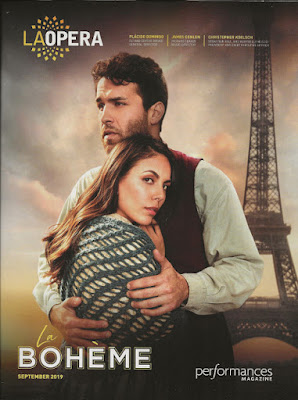
Giacomo Puccini's La Bohème is one of the most widely known and, thus, widely produced operas around the world, and so it would be easy, and quite understandable, for a company to play it safe and traditional with its staging. But after mounting the same Herbert Ross-directed production no less than seven times (most recently in 2016) over the last 25 years, LA Opera revives Puccini's tale of bohemian bonhomie and tragic romance in a dark, striking, and different staging that director Barrie Kosky premiered in Berlin earlier this year.
The particulars of the plot remain as familiar as they have been to opera aficionados--and, for that matter, fans of Jonathan Larson's ever-popular La Bohème-inspired '90s musical Rent. In 1830s Paris, poet Rodolfo (Saimir Pirgu), "painter" (more on the quotes later) Marcello (Kihun Yoon), philosopher Colline (Nicholas Brownlee), and musician Schaunard (Michael J. Hawk) are starving artist roommates struggling to pay rent to landlord Benoit (who, in Kosky's big deviation, does not appear at all here, with the four instead play-acting his part); Marcello pines over lost love Musetta (Erica Petrocelli), has moved on to another; Rodolfo meets and falls for neighbor Mimi (Marina Costa-Jackson), but looming over their romance is the spectre of disease. Coincidental or not, one cannot help but see some echoes of Larson's work here, from the more youthful than the norm cast, to the Mimi here sharing Mimi Marquez's bright, forceful joie de vivre that only the absolute final stages of terminal illness can dampen, to making Marcello only a metaphoric "painter" and more literally working in film, namely early forms of photography.
But, make no mistake, this La Bohème is distinctly Kosky's own. Much of his concept springs from that shift in Marcello's art, with blacks, whites, and greys dominating the palette he crafts with scenic designer Rufus Didwiszus and lighting director Alessandro Carletti. While this choice falls a bit short in act three, where a static black and white, period photography-tech accurate street scene drop feels a bit too minimalist, it makes for an appropriately ominous atmosphere hanging over the entire proceedings and lends a darkly alluring sense of decadence and indulgence to the act 2 Cafe Momus. It is here that Kosky and his designers appropriately go the most grandiose, with the principal cast and a horde of chorus members young and old in Victoria Behr's striking costumes create a vibrant, bustling, constantly shifting scene on a revolve stage. The exuberance is in effective, sharp relief to more somber turn post-intermission and, of course, in the fourth and final act, where the tragedy is augmented by some truly stunning stage pictures, particularly the final images.
But images would only half serve Puccini's intended effect, and thankfully Kosky's cast is up to the task in lending the characters life. All of the principals are in strong, fine voice, but appropriately the pair of romantic leads make the strongest impression, with Pirgu and Costa-Jackson fittingly striking an immediate spark right from when Rodolfo lights Mimi's candle. Costa-Jackson especially resonates in both literal and character voice, and once Mimi takes her final breath, Kosky's untraditional approach lends the loss and the overall production a lingering and haunting sadness and shiver.
LA Opera's production of La Bohème will have two more performances, on Wednesday, October 2, and Sunday, October 6, at the Dorothy Chandler Pavilion in The Music Center in Downtown Los Angeles.
(Special thanks to LA Opera)
The Movie Report wants to attend all your live stage productions! Please send any and all invitations to this address. Thanks!





